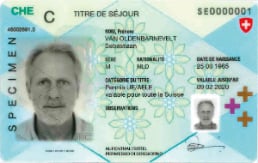If you are a foreign national employed in Switzerland (or just living here), your permit is a very valuable possession.
You should, of course, guard it with your life and never part with it, but sometimes that little credit-card-like document disappears mysteriously from your wallet. You probably won’t know whether it was lost or stolen; all you know is that it is missing.

Photo: State Secretariat for Migration SEM
What should you do?
First of all, don’t panic. It is not the end of the world — though it may seem like it — and it doesn’t mean you’ll be thrown out of Switzerland.
You will need to request a replacement from your canton of residence, a process which is usually pretty efficient.
Here are the steps to take:
First, you must announce the loss / theft to the police in your place of residence, who will issue a report.
You must then bring this certificate to your local administration’s population department (Einwohnerkontrolle in German, contrôle des habitants in French, and Controllo abitanti in Italian), which is in charge of all matters related to residence in a given municipality.
In some cases, you can find online a form requesting a replacement, print it, fill it out and bring it with you to the administration office.
How to apply for Swiss citizenship: An essential guide
When you go there, bring your passport, a passport photo, as well as and the police report of the loss / theft. of permit.
A duplicate permit will be issued to you, though the fee for this service and the time it takes to get a new permit varies from one canton to another, and also depends on what kind of permit you are replacing.
What happens if your permit is lost / stolen abroad?
In this event, the procedure is a bit more complicated (or a lot more complicated, depending on a country’s bureaucracy).
As is the case in Switzerland, you must first announce the loss / theft to the local police and bring the report to a Swiss Embassy or Consulate, which will issue a temporary document enabling you to return to Switzerland.
This, however, will take some time, as the foreign representation will have to contact the canton which issued your permit.
Once back in Switzerland, you should take this paperwork to your local Einwohnerkontrolle / contrôle des habitants / controllo abitanti office and request a new permit, as above.
Note, however, that once a replacement permit is issued, the original one is invalidated, so if you happen to find it afterwards, don’t use it.



 Please whitelist us to continue reading.
Please whitelist us to continue reading.
Member comments